语法英语句子的八大成分定义及例句
八种句子成分

句子成分一.定义定义构成句子的各个部分叫做句子成分主要成分主语和谓语次要成分宾语、表语、定语、状语、补足语和同位语二.八种成分的用法【主语】主语定义主语是一个句子所叙述的主体.主语位置一般位于句首.但在there be结构、疑问句(当主语为疑问词时)和倒装句中,主语位于谓语、助动词或情态动词后面哪些词可以作主语名词,代词,数词,不定式,动名词,名词化的形容词,短语,句子The village is very beautiful.(名词)Who is speaking,please?(电话中问对方是谁)(代词)Two will be enough.(数词)To translate this ideal into reality needs hard work.(不定式)Skating is good exercise.(动名词)The blind and the lame are well cared for in our country.(名词化的形容词)How to do well is an important question.(短语)What has happened proves that our policy is right.(句子)【谓语】谓语定义谓语说明主语所做的动作或具有的特征和状态.动词在句中作谓语谓语位置一般放在主语之后.谓语的构成如下:1、简单谓语:由一个动词或动词短语构成.如:He practices running every morning.2、复合谓语:(1)由情态动词或其他助动词加动词原形构成.如:You may keep the book for two weeks. He has caught a bad cold.(2)由系动词加表语构成.如:We are students.【宾语】宾语定义宾语表示动作的对象或承爱者宾语位置一般位于及物动词和介词后面哪些词可以作宾语名词,代词,数词,名词化的形容词,不定式,动名词,动名词短语,句子She is doing her homework now.(名词)I like it very much.(代词)How many dictionaries do you have? I have five.(数词)They helped the old with their housework yesterday.(名词化形容词)【定语】【状语】I shall go there if it doesn’t rain.(条件状语)Mr Smith lives on the third floor.(地点状语)She put the eggs into the basket with great care.(方式状语)She came in with a dictionary in her hand.(伴随状语)In order to ca tch up with the others, I must work harder.(目的状语)He was so tired that he fell asleep immediately.(结果状语)She works very hard though she is old.(让步状语)I am taller than he is.(比较状语)【宾语补足语】宾语补足语定义英语中有些及物动词,除有一个直接宾语以外,还要有一个宾语补语,才能使句子的意义完整.这种宾语补语就是宾语补足语.宾语补足语位置带有宾语补足语的一般句型为:某些及物动词(如make等+宾语+宾补)哪些词可以作宾语宾补可由名词、形容词、副词、不定式、分词、介词短语和句子充当His father named him Dongming.(名词)They painted their boat white.(形容词)Let the fresh air in.(副词)You mustn’t force him to lend his money to you.(不定式)We saw her entering the room.(现在分词)I had my bike repaired yesterday.(过去分词)We found everything in the lab in good order.(介词短语)We will soon make our city what your city is now.(句子)【表语】表语定义表语用以说明主语的身份、特征和状态表语位置它一般位于系动词(如be, become, get, look, grow, turn, seem等)之后.哪些词可以作表语表语一般由名词、代词、形容词、分词、数词、不定式、动名词、介词短语、副词及句子表示Our teacher of English is an American.(名词)Is it yours?(代词)The weather has turned cold.(形容词)The speech is exciting.(分词)Three times seven is twenty one?(数词)His job is to teach English.(不定式)His hobby(爱好)is playing football.(动名词)The machine must be out of order.(介词短语)Time is up. The class is over.(副词)The truth is that he has never been abroad.(表语从句)【同位语】定义一个名词(其它形式)对另一个名词或代词进行解释或补充说明,这个词(或其它形式)就是同位语位置同位语与被它限定的词的格式要一致,并常常紧挨在一起充当同位语的词名词,动名词,不定式,形容词,名词短语,动名词短语,不定式短语,介词短语,形容词短语直接引语,句子Mr wang,my child’s teacher,will be visiting us on Tuesday.(名词)I,the oldest girl in the family,always had to care for the other children.(名词短语)He enjoys the exercise,swimming in winter.(动名词)Asking him to join us,that’s a good ides.(动名词短语)Their aspiration,to become free and independent,is deserving of every kind of help from us.(不定式)The question what to do next hasn’t been considered.(不定式短语)As the head of the company,he had to explain what had happened.(介词短语)He,short and thin,is unfit for the job.(形容词)All the countries,big or small,are equal.(形容词短语)But now the question comes to their minds,“Did she die young because she was a clone?”(直接引语)The girl were surprised at the fact that ocean ships can sail up the Great lakes.(句子)【大展身手】1. ____ will leave for Beijin g.A. Now there the manB. The man here nowC. The man who is here nowD. The man is here now2. The weather ____.A. wet and cold B. is wet and co ldC. not wet and cold D. were wet and cold3. The apple tasted ____.A. sweets B. sweetly C. nicely D. sweet4. He got up ____ yesterday morning.A. lately B. late C. latest D. latter5. The actor ______at the age of 70.A. dead B. died C. dyed D. deaded6. ____ were all very tired, but none of ____ would stop to take a rest.A. We, usB. Us, weC. We, ourD. We, we7. He found the street much ______.A. crowd B. crowding C. crowded D. crowdedly8.I think _____necessary to learn English well.A. its B. i t C. that D. that is9. The dog ____ mad.A. looks B. is looked C. is being looked D. was looked10.I will never forget the day ______I joined the army.A. that B. when C. in which D. Where Keys:1-5 CBDBB 6-10 ACBAB。
英语八大基本句型结构

英语八大基本句型结构英语句子的构成结构是语言学中的重要内容,理解句子结构可以帮助我们更好地理解和运用英语。
根据句子的成分和结构组成,英语句子可以分为八大基本句型结构。
下面将分别介绍这八种句型结构,并提供一些例句来帮助理解。
1. S + V这是最基本的英语句型结构,包含一个主语和一个谓语动词。
例句:She sings.2. S + V + O在这种结构中,除了主语和动词,还有一个宾语。
例句:I love you.3. S + V + CC代表补语,补语可以是形容词、名词或介词短语等,用来描述或补充主语。
例句:He is a doctor.4. S + V + IO + DOIO和DO分别代表间接宾语和直接宾语,这种结构常用于表示给予或传递某物给他人。
例句:She gave me a gift.5. S + V + O + O.CO.C代表宾补,用来补充说明宾语的状态或特征。
例句:They elected him president.6. S + V + O + OCOC同样代表宾补,但在这种情况下,宾语是形容词,用于描述宾语。
例句:I find her beautiful.7. There + V + S这种结构通常用于强调存在或引起注意。
例句:There is a cat in the garden.8. It + V + S这种结构常用于表示天气、时间、距离等。
例句:It is raining outside.这八种基本句型结构是英语语法的基础,掌握好它们能够帮助我们更加准确地表达和理解英语句子。
通过不断的练习和运用,我们可以熟练地使用这些句型结构,使我们的英语表达更加流利和自然。
总结:了解和掌握英语句子的基本结构对于学习和提高英语能力至关重要。
通过熟悉这八种基本句型结构,我们可以更好地理解和运用英语,使我们的表达更加准确和流利。
不断练习和使用这些句型结构,将有助于我们在英语学习的道路上取得更大的进步。
英语八大语法
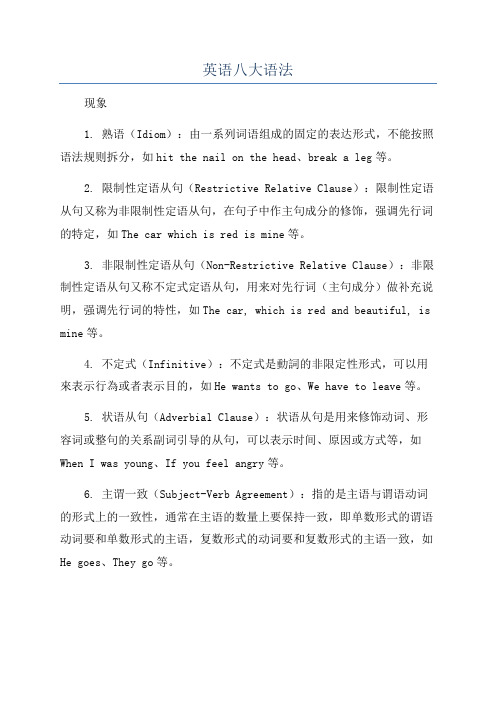
英语八大语法现象1. 熟语(Idiom):由一系列词语组成的固定的表达形式,不能按照语法规则拆分,如hit the nail on the head、break a leg等。
2. 限制性定语从句(Restrictive Relative Clause):限制性定语从句又称为非限制性定语从句,在句子中作主句成分的修饰,强调先行词的特定,如The car which is red is mine等。
3. 非限制性定语从句(Non-Restrictive Relative Clause):非限制性定语从句又称不定式定语从句,用来对先行词(主句成分)做补充说明,强调先行词的特性,如The car, which is red and beautiful, is mine等。
4. 不定式(Infinitive):不定式是動詞的非限定性形式,可以用來表示行為或者表示目的,如He wants to go、We have to leave等。
5. 状语从句(Adverbial Clause):状语从句是用来修饰动词、形容词或整句的关系副词引导的从句,可以表示时间、原因或方式等,如When I was young、If you feel angry等。
6. 主谓一致(Subject-Verb Agreement):指的是主语与谓语动词的形式上的一致性,通常在主语的数量上要保持一致,即单数形式的谓语动词要和单数形式的主语,复数形式的动词要和复数形式的主语一致,如He goes、They go等。
7. 动名词(Gerund):动名词是一种带有名词性质的动词形式,多用于形容词短语和状语从句中,可以表示持续的动作或行为,如Sleeping late、Going home等。
8. 短语动词(Phrasal Verb):是指动词加上介词或副词组成的短语,表达不同的概念,如Take off、Look up等。
八种句子成分英语
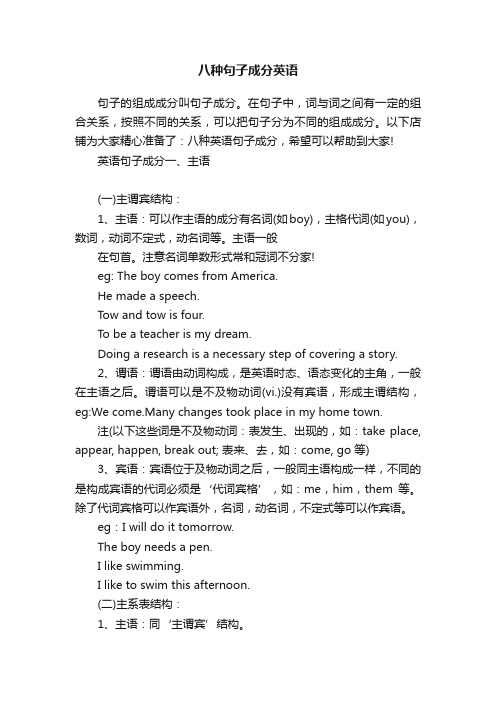
八种句子成分英语句子的组成成分叫句子成分。
在句子中,词与词之间有一定的组合关系,按照不同的关系,可以把句子分为不同的组成成分。
以下店铺为大家精心准备了:八种英语句子成分,希望可以帮助到大家!英语句子成分一、主语(一)主谓宾结构:1、主语:可以作主语的成分有名词(如boy),主格代词(如you),数词,动词不定式,动名词等。
主语一般在句首。
注意名词单数形式常和冠词不分家!eg: The boy comes from America.He made a speech.Tow and tow is four.To be a teacher is my dream.Doing a research is a necessary step of covering a story.2、谓语:谓语由动词构成,是英语时态、语态变化的主角,一般在主语之后。
谓语可以是不及物动词(vi.)没有宾语,形成主谓结构,eg:We come.Many changes took place in my home town.注(以下这些词是不及物动词:表发生、出现的,如:take place, appear, happen, break out; 表来、去,如:come, go 等)3、宾语:宾语位于及物动词之后,一般同主语构成一样,不同的是构成宾语的代词必须是‘代词宾格’,如:me,him,them等。
除了代词宾格可以作宾语外,名词,动名词,不定式等可以作宾语。
eg:I will do it tomorrow.The boy needs a pen.I like swimming.I like to swim this afternoon.(二)主系表结构:1、主语:同‘主谓宾’结构。
2、谓语:联系动词(Link verb):be动词(am,is,are,was,were,have been);其他联系动词如:become成为,turn变成,go变和感官动词如:feel, touch, hear, see等。
句子八大成分
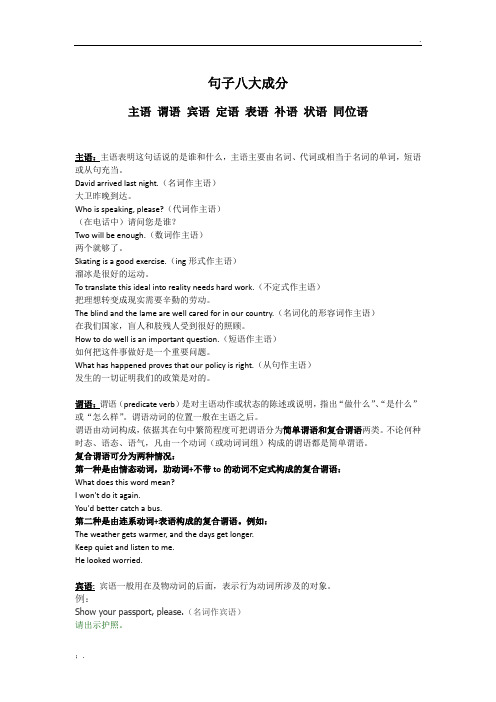
句子八大成分主语谓语宾语定语表语补语状语同位语主语:主语表明这句话说的是谁和什么,主语主要由名词、代词或相当于名词的单词,短语或从句充当。
David arrived last night.(名词作主语)大卫昨晚到达。
Who is speaking, please?(代词作主语)(在电话中)请问您是谁?Two will be enough.(数词作主语)两个就够了。
Skating is a good exercise.(ing形式作主语)溜冰是很好的运动。
To translate this ideal into reality needs hard work.(不定式作主语)把理想转变成现实需要辛勤的劳动。
The blind and the lame are well cared for in our country.(名词化的形容词作主语)在我们国家,盲人和肢残人受到很好的照顾。
How to do well is an important question.(短语作主语)如何把这件事做好是一个重要问题。
What has happened proves that our policy is right.(从句作主语)发生的一切证明我们的政策是对的。
谓语:谓语(predicate verb)是对主语动作或状态的陈述或说明,指出“做什么”、“是什么”或“怎么样”。
谓语动词的位置一般在主语之后。
谓语由动词构成,依据其在句中繁简程度可把谓语分为简单谓语和复合谓语两类。
不论何种时态、语态、语气,凡由一个动词(或动词词组)构成的谓语都是简单谓语。
复合谓语可分为两种情况:第一种是由情态动词,助动词+不带to的动词不定式构成的复合谓语:What does this word mean?I won't do it again.You'd better catch a bus.第二种是由连系动词+表语构成的复合谓语。
英语语法1——句子成分分析
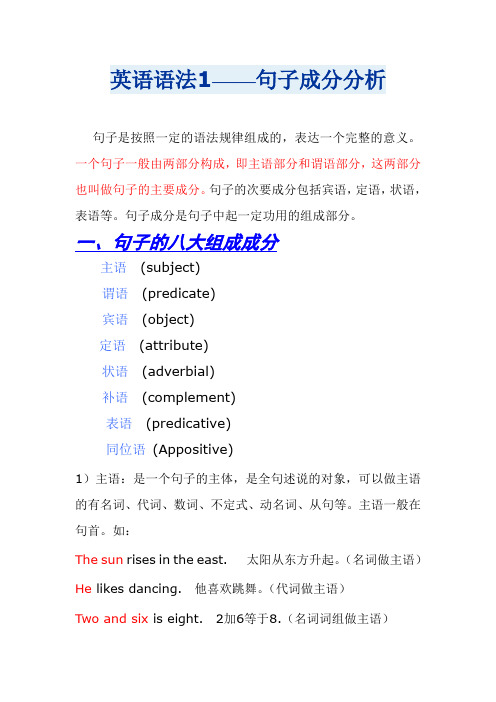
英语语法1——句子成分分析句子是按照一定的语法规律组成的,表达一个完整的意义。
一个句子一般由两部分构成,即主语部分和谓语部分,这两部分也叫做句子的主要成分。
句子的次要成分包括宾语,定语,状语,表语等。
句子成分是句子中起一定功用的组成部分。
一、句子的八大组成成分主语(subject)谓语(predicate)宾语(object)定语(attribute)状语(adverbial)补语(complement)表语(predicative)同位语(Appositive)1)主语:是一个句子的主体,是全句述说的对象,可以做主语的有名词、代词、数词、不定式、动名词、从句等。
主语一般在句首。
如:The sun rises in the east. 太阳从东方升起。
(名词做主语)He likes dancing. 他喜欢跳舞。
(代词做主语)Two and six is eight. 2加6等于8.(名词词组做主语)Seeing is believing.眼见为实。
(动名词做主语)To see is to believe. 眼见为实。
(不定式)What he needs is a book.他所需要的是本书(主语从句做主语)2)谓语:是对主语加以陈述,说明主语是什么,做什么,怎么样,常用动词或者动词词组担任,放在主语的后面。
如:We are friends. 我们是朋友。
She seemed tired. 她看起来累了。
The new term begins on the 1st of September.新学期在九月一日开始。
一个英语句子的组成可归纳如下:句子=主语+谓语例如:Yang Kang is a smart student in his class.主语谓语注意:并不是所有英语句子都由主语和谓语构成(如祈使句和感叹语等)。
这种模式只适用于对大部分普通句型的分析。
简单的句子谓语部分很简单,但大部分句子的谓语部分比较复杂,因此在分析其组成成分时,要引入谓语动词(或谓语动词词组)、宾语、补语、状语等成分。
八大英语句子成分
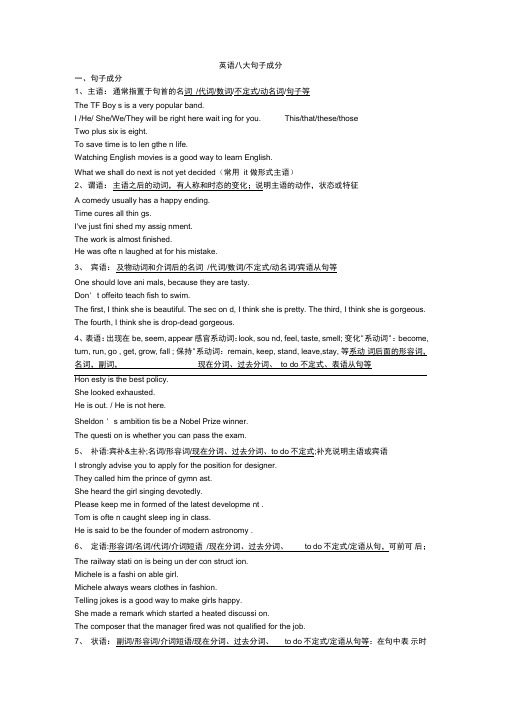
英语八大句子成分一、句子成分1、主语:通常指置于句首的名词/代词/数词/不定式/动名词/句子等The TF Boy s is a very popular band.I /He/ She/We/They will be right here wait ing for you. This/that/these/thoseTwo plus six is eight.To save time is to len gthe n life.Watching English movies is a good way to learn English.What we shall do next is not yet decided(常用it 做形式主语)2、谓语:主语之后的动词,有人称和时态的变化;说明主语的动作,状态或特征A comedy usually has a happy ending.Time cures all thin gs.I've just fini shed my assig nment.The work is almost finished.He was ofte n laughed at for his mistake.3、宾语:及物动词和介词后的名词/代词/数词/不定式/动名词/宾语从句等One should love ani mals, because they are tasty.Don' t offeito teach fish to swim.The first, I think she is beautiful. The sec on d, I think she is pretty. The third, I think she is gorgeous. The fourth, I think she is drop-dead gorgeous.4、表语:出现在be, seem, appear 感官系动词:look, sou nd, feel, taste, smell; 变化"系动词":become, turn, run, go , get, grow, fall ; 保持"系动词:remain, keep, stand, leave,stay, 等系动词后面的形容词,名词,副词,现在分词、过去分词、to do不定式、表语从句等Hon esty is the best policy.She looked exhausted.He is out. / He is not here.Sheldon ' s ambition tis be a Nobel Prize winner.The questi on is whether you can pass the exam.5、补语:宾补&主补;名词/形容词/现在分词、过去分词、to do不定式;补充说明主语或宾语I strongly advise you to apply for the position for designer.They called him the prince of gymn ast.She heard the girl singing devotedly.Please keep me in formed of the latest developme nt .Tom is ofte n caught sleep ing in class.He is said to be the founder of modern astronomy .6、定语:形容词/名词/代词/介词短语/现在分词、过去分词、to do 不定式/定语从句,可前可后;The railway stati on is being un der con struct ion.Michele is a fashi on able girl.Michele always wears clothes in fashion.Telling jokes is a good way to make girls happy.She made a remark which started a heated discussi on.The composer that the manager fired was not qualified for the job.7、状语:副词/形容词/介词短语/现在分词、过去分词、to do不定式/定语从句等:在句中表示时间/地点/原因/目的/结果/方式/条件/让步/比较等The travelers came back, safe and sound.From space the astronaut saw a blue globe.With all his faults, he is still a good guy.He looked around the table, his eyes flat, his face pale.It is never too late to learn.Don' t giveup if you want to do something.8、同位语: 名词代词后,名词/代词/句子等We students should study hard and learn to be the person kind, honest and tolerant. Helping others is a good habit, one you can learn even at an early age.The saying that beauty is but skin deep is but a skin deep saying.。
八大英语句子成分 → 英语句子的八个核心成分
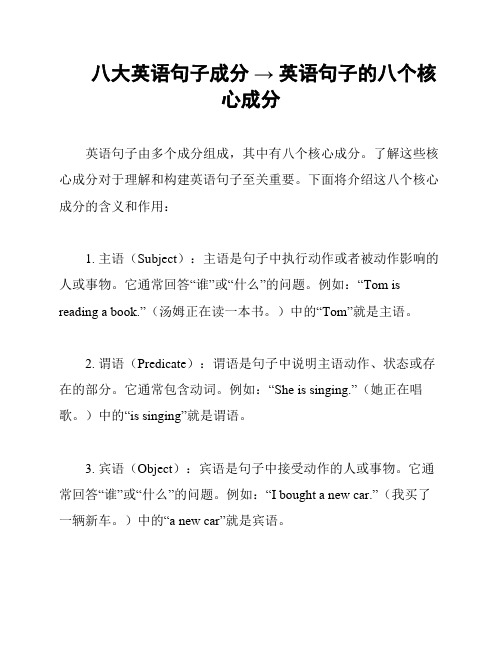
八大英语句子成分→ 英语句子的八个核心成分英语句子由多个成分组成,其中有八个核心成分。
了解这些核心成分对于理解和构建英语句子至关重要。
下面将介绍这八个核心成分的含义和作用:1. 主语(Subject):主语是句子中执行动作或者被动作影响的人或事物。
它通常回答“谁”或“什么”的问题。
例如:“Tom is reading a book.”(汤姆正在读一本书。
)中的“Tom”就是主语。
2. 谓语(Predicate):谓语是句子中说明主语动作、状态或存在的部分。
它通常包含动词。
例如:“She is singing.”(她正在唱歌。
)中的“is singing”就是谓语。
3. 宾语(Object):宾语是句子中接受动作的人或事物。
它通常回答“谁”或“什么”的问题。
例如:“I bought a new car.”(我买了一辆新车。
)中的“a new car”就是宾语。
5. 定语(Adjective):定语是句子中修饰名词或代词的成分。
它通常回答“怎样的”、“哪一个”的问题。
例如:“The blue car is mine.”(那辆蓝车是我的。
)中的“blue”就是定语。
6. 状语(Adverbial):状语是句子中修饰动词、形容词、副词或整个句子的成分。
它通常回答“怎样”、“在何处”、“为何目的”等问题。
例如:“He runs slowly.”(他跑得慢。
)中的“slowly”就是状语。
7. 定语从句(Relative Clause):定语从句是一个从句,用来修饰前面的名词或代词,并进一步说明其特征。
例如:“The book that I read is interesting.”(我读的那本书很有趣。
)中的“that I read”就是定语从句。
8. 状语从句(Adverbial Clause):状语从句是一个从句,用来修饰整个句子、动词、形容词或副词。
它通常回答“为什么”、“当”、“在哪里”等问题。
例如:“I will go shopping after I finish my work.”(我完成工作后会去购物。
英语八大句子成分

英语八大句子成分英语句子有八大成分,它们分别是:主语、谓语、表语、宾语、定语、状语、同位语和补语。
一、主语主语是句子的中心,是句子的表明者,由名词或代词构成,也可由介词短语或名词性从句构成。
主语位于谓语之前,它是谓语动词谓语动词所指的人或物。
如:Tom likes music。
(汤姆喜欢音乐)二、谓语谓语是句子的核心,它表示一个动作或一种状态,句子中一般位于主语之后,常由动词构成,也可以是一个动词短语。
如:Tom likes music。
(汤姆喜欢音乐)三、表语表语也称肯定语,作用是对句子的主语做出描述,表语由形容词、副词、介词短语或名词性从句构成,位于谓语动词之后。
如:John isa student.(约翰是一名学生)四、宾语宾语是动词的受事,由名词或代词构成,位于谓语动词之后。
宾语一般代表谓语动词的承受者,一般来说句子中的宾语都在谓语之后,与谓语动词形成主谓结构。
如:The teacher taught us English.(老师教我们英语)五、定语定语修饰句子中的名词,一般位于名词之前,由形容词、名词所有格、动名词或介词短语构成,可放在句子中,也可位于句子的末尾。
如:This is the man who helped me.(这就是帮助我的人)六、状语状语是一个句子的补充成分,它修饰说明句子的时间、地点、原因、条件等状态,由副词、介词短语、状语从句等构成。
它多放在句首,有时也放在句子末尾。
如:I often go to the library after school.(放学后我经常去图书馆)七、同位语同位语是一个名词性成分,用于替代另一个名词,同位语位于句子中,它与主语之间有关联,并对主语作出解释。
它可以由名词、代词、形容词、介词短语、分词短语、副词和名词性从句等构成,如:He is a teacher, an occupation he loves.(他是一名老师,是他喜欢的职业)八、补语补语是句子的完成成分,用于对谓语动词进行补充,补语可以由形容词、介词短语或名词性从句构成,补语位于谓语动词之后,它对谓语动词作出补充说明。
句子成分的例句(句子成分划分完整例句)

作为语言类学科句子成分的例句,英语与汉语是有很多共通之处的。
但由于所属语系不同,英语与汉语在句子成分、句子结构等语法规则方面还是有很大差异的。
今天我们就来说说英语的句子成分,大家也来总结总结,英语和汉语在句子成分上有什么差异吧。
英语的句子成分主要分为八种:主语、谓语、宾语、定语、状语、表语、宾语补足语、同位语。
主语是句子所要说的人或事物,表示“谁”或者“什么”。
一般放在句子开头,通常用名词或代词充当。
如:I'm Miss Green. 我是格林小姐。
谓语说明主语的动作或状态,表示“做(什么)”。
主要由动词充当。
如:Jack clean the room every day. 杰克每天打扫房间。
表语在系谓语(系动词)之后,说明主语的身份或特征,表示是“什么”或者“怎么样”。
通常由名词、代词或形容词充当。
如:My name is Ping ping. 我的名字叫萍萍。
宾语表示及物谓语的对象或结果,表示做的是“什么”。
一般放在谓语动词后,通常由名词或代词充当。
如:He can spell the word. 他能拼这个词。
note:有些及物谓语带有两个宾语,一个指物,一个指人。
指物的叫直接宾语,指人的叫间接宾语。
间接宾语一般放在直接宾语的前面。
如:He wrote me a letter.他给我写句子成分的例句了一封信。
定语修饰名词或代词,通常由形容词、代词、数词等充当。
如: Shanghai is a big city. 上海是个大城市。
状语用来修饰动词、形容词、副词,通常由副词充当。
如: He works hard. 他努力工作。
宾语补足语用来说明宾语怎么样或干什么,一般放在宾语后面,通常由形容词或动词充当。
如:They usually keep their classroom clean. 他们通常让教室保持清洁。
/ He often helps me do my homework. 他经常帮助我做家庭作业。
八大英语句子成分 → 英语句子的八个基本成分

八大英语句子成分→ 英语句子的八个基本成分英语句子是构建英语语言的基本单位,它由八个基本成分组成。
了解这些成分有助于我们正确理解和使用英语句子。
下面是英语句子的八个基本成分:1. 主语(Subject):主语是句子中执行动作或被描述的人、物、事物或概念。
它通常位于句子的开头,并与动词一起构成谓语部分。
例如:Mary *is* a teacher.Mary *is* a teacher.2. 谓语(Predicate):谓语是句子中描述主语动作、状态或存在的部分。
它通常包含一个动词,但也可能有其他补足成分。
例如:Mary *is* a teacher.a teacher.3. 宾语(Object):宾语是句子中接受动作的人、物、事物或概念。
它通常跟在动词后面,帮助说明动作的目标或作用对象。
例如:Mary teaches English.English.4. 定语(Adjective):定语用来描述或修饰名词或代词。
它通常位于名词前面,提供额外的信息或限制名词的范围。
例如:The tall man is my brother.The tall man is my brother.5. 状语(Adverb):状语用来描述或修饰动词、形容词、副词或整个句子。
它可以提供时间、地点、方式、原因等方面的信息。
例如:He runs quickly.quickly.7. 状语从句(Adverbial Clause):状语从句是一个句子,用来作为一个整体修饰另一个句子中的动词、形容词或副词。
它提供了额外的信息,如时间、条件、目的等。
例如:He went to bed after he finished his homework.after he finished his homework.8. 定语从句(Adjective Clause):定语从句是一个句子,用来修饰名词或代词。
它通常用来提供关于名词或代词的进一步描述或限制。
英语八大句子结构及例句

英语八大句子结构及例句以下是英语八大句子结构的报告,包括每个句子结构的定义和例句:句子结构一:主语 + 谓语(不及物动词)定义:主语是句子中的主要名词或代词,谓语是不及物动词,即动词后面不需要宾语。
例句:The sun rises in the east.(太阳从东方升起。
)句子结构二:主语 + 谓语(及物动词)+ 宾语定义:主语是句子中的主要名词或代词,谓语是及物动词,即动词后面需要一个宾语。
宾语是动作的承受者。
例句:We love English.(我们喜欢英语。
)句子结构三:主语 + 谓语 + 间接宾语 + 直接宾语定义:主语是句子中的主要名词或代词,谓语是及物动词,需要两个宾语,一个是间接宾语,一个是直接宾语。
间接宾语表示动作间接地作用于某人,直接宾语则是动作的直接承受者。
例句:Please pass me the book.(请递给我那本书。
)句子结构四:主语 + 谓语 + 宾语 + 宾补定义:主语是句子中的主要名词或代词,谓语是及物动词,需要一个宾语,但还需要一个宾语补足语来补充说明宾语的状态或身份。
例句:His father named him Tom.(他的父亲给他起名叫汤姆。
)句子结构五:主语 + 联系动词 + 表语定义:主语是句子中的主要名词或代词,联系动词也称系动词,用来连接主语和表语。
表语用来描述主语的身份、特征或状态。
例句:The book is mine.(这本书是我的。
)句子结构六:主语 + 谓语 + 状语定义:主语是句子中的主要名词或代词,谓语是不及物动词或及物动词。
状语用来描述动作发生的时间、地点、方式等。
例句:We usually go to school by bike.(我们通常骑自行车上学。
)句子结构七:主语 + 谓语 + 宾语 + 状语定义:主语是句子中的主要名词或代词,谓语是及物动词,需要一个宾语,还可以有一个状语来描述动作发生的时间、地点、方式等。
英语句子的八种成分

英语句⼦的⼋种成分英语⼋⼤句⼦成分:主、谓、宾、定、状、补、表、同组成句⼦的各个部分叫句⼦成分。
英语句⼦成分有主语、谓语、宾语、宾语补⾜语、表语、定语、状语和同位语。
⼀、主语1. 含义:(1) 主语是“动作的发出者”(主谓宾结构)I like China. 我爱中国。
(2) 主语是“表述的对象”(主系表结构)。
China is a beautiful country.中国是⼀个美丽的国家。
2. 位置:主语⼀般放在句⾸,有时也放在句中或句尾。
3. 哪些可以作主语?充当主语的可以是名词、代词、数词、不定式、动名词或整个句⼦。
(1)名词作主语Books are our good friends.书是我们的好朋友。
(2)代词作主语I love reading books. 我喜欢阅读。
(3)数词作主语A billion is not big deal for Ma Yun.对马云来说,⼗亿不算什么。
(4)不定式作主语To know everything is to know nothing.事事皆懂,⽆⼀精通。
(5)V-ing形式作主语Reading a lot is good for you.多阅读对你有好处。
(6)从句做主语(即主语从句)从句作主语的句⼦,就是我们学过的主语从句。
主语从句可以由连词that/whether引导,也可以由关系代词what/who/which引导,还可以由连接副词how/when/why/where引导。
① That he didn't come is a pity.他没来是个遗憾。
② What I need is time.我需要的是时间。
③ Whether we'll go camping tomorrow depends on the weather.我们明天是否去宿营取决于天⽓。
有时为了避免句⼦的头重脚轻,经常会借助it充当形式主语,⽽真正的主语放在句尾。
八种句子成分英语

八种句子成分英语句子的组成成分叫句子成分。
在句子中,词与词之间有一定的组合关系,按照不同的关系,可以把句子分为不同的组成成分。
以下本人为大家精心准备了:八种英语句子成分,希望可以帮助到大家!英语句子成分一、主语(一)主谓宾结构:1、主语:可以作主语的成分有名词(如 boy),主格代词(如 you),数词,动词不定式,动名词等。
主语一般在句首。
注意名词单数形式常和冠词不分家!eg: The boy comes from America.He made a speech.Tow and tow is four.To be a teacher is my dream.Doing a research is a necessary step of covering a story。
2、谓语:谓语由动词构成,是英语时态、语态变化的主角,一般在主语之后.谓语可以是不及物动词(vi.)没有宾语,形成主谓结构, eg:We come。
Many changes took place in my home town。
注(以下这些词是不及物动词:表发生、出现的,如: take place, appear, happen, break out;表来、去,如:come, go 等)3、宾语:宾语位于及物动词之后,一般同主语构成一样,不同的是构成宾语的代词必须是‘代词宾格',如:me,him,them 等。
除了代词宾格可以作宾语外,名词,动名词,不定式等可以作宾语eg: I will do it tomorrow。
The boy needs a pen.I like swimming。
I like to swim this afternoon.( 二)主系表结构:1、主语:同‘主谓宾'结构.2、谓语:联系动词 (Link verb): be 动词(am,is,are,was,were,have been);其他联系动词如: become 成为, turn 变成,go 变和感官动词如: feel, touch, hear, see 等.其特点是联系动词与其后的表语没有动宾关系,表语多为形容词或副词,既,不可能是宾语。
八大英语句子成分 → 英语句子的八个基本要素

八大英语句子成分→ 英语句子的八个基本要素英语句子是由若干个基本句子成分组成的,这些成分相互结合形成了完整的句子意义。
了解英语句子的基本要素可以帮助我们更好地理解句子结构和语法规则。
以下是英语句子的八个基本要素:1. 主语(Subject):主语是句子中执行动作或者被施加动作的人或事物。
它通常回答“谁”或“什么”的问题。
例如:The cat (猫) is sleeping.2. 谓语(Predicate):谓语是主语所执行的动作、状态或者存在的情况。
它通常回答“做什么”或者“是什么”的问题。
例如:The cat is sleeping.3. 宾语(Object):宾语是句子中接受动作的人或事物。
它通常回答“接受什么”的问题。
例如:The cat is sleeping (睡觉) on the mat.4. 定语(Adjective):定语是修饰名词或代词的词语,用于描述或限定名词或代词的性质、特点等。
例如:The big (大的) cat is sleeping on the mat.5. 状语(Adverb):状语是修饰动词、形容词、副词或整个句子的词语,用于表示时间、地点、程度、方式等。
例如:The cat is sleeping quietly (安静地) on the mat.6. 表语(Predicate Nominative):表语是用来进一步说明主语的词语,通常与系动词连用。
例如:He is a teacher (老师).7. 定语从句(Adjective Clause):定语从句是修饰名词或代词的从句,用于进一步说明名词或代词的性质、特点等。
例如:The book that is on the table is mine.8. 状语从句(Adverb Clause):状语从句是修饰动词、形容词、副词或整个句子的从句,用于表示时间、地点、原因、条件等。
例如:I will go to bed when I finish my homework.以上是英语句子的八个基本要素,它们在句子中扮演着不同的角色,共同构成了句子的完整意义。
英语八大基本句型及例句
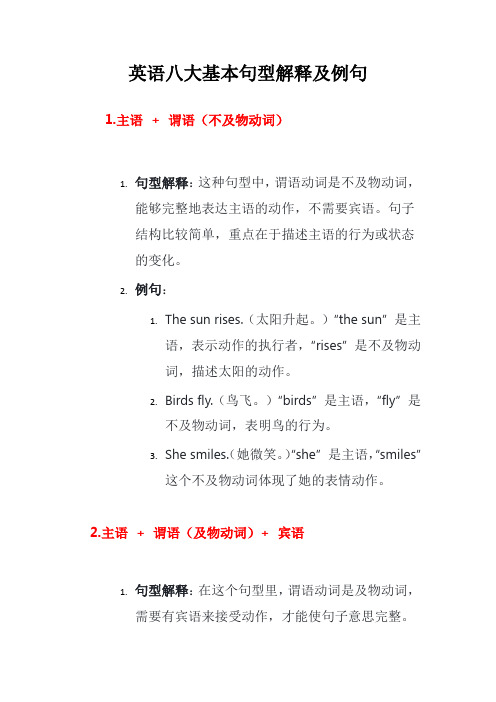
英语八大基本句型解释及例句1.主语+ 谓语(不及物动词)1.句型解释:这种句型中,谓语动词是不及物动词,能够完整地表达主语的动作,不需要宾语。
句子结构比较简单,重点在于描述主语的行为或状态的变化。
2.例句:1.The sun rises.(太阳升起。
)“the sun” 是主语,表示动作的执行者,“rises” 是不及物动词,描述太阳的动作。
2.Birds fly.(鸟飞。
)“birds” 是主语,“fly” 是不及物动词,表明鸟的行为。
3.She smiles.(她微笑。
)“she” 是主语,“smiles”这个不及物动词体现了她的表情动作。
2.主语+ 谓语(及物动词)+ 宾语1.句型解释:在这个句型里,谓语动词是及物动词,需要有宾语来接受动作,才能使句子意思完整。
宾语通常是名词、代词或者相当于名词的短语等,用来回答谓语动词“动作的对象是什么” 的问题。
2.例句:1.He reads books.(他读书。
)“he” 是主语,“reads” 是及物动词,“books” 是宾语,表明“读” 这个动作的对象是书。
2.She loves music.(她喜欢音乐。
)“she” 为主体即主语,“loves” 是表达情感的及物动词,“music” 作为宾语,是“爱” 这个动作所涉及的内容。
3.They play football.(他们踢足球。
)“they” 是主语,“play” 是及物动词,“football” 是宾语,清楚地展示了动作及其对象。
3.主语+ 系动词+ 表语1.句型解释:此句型主要用于描述主语的特征、状态、身份等。
系动词起到连接主语和表语的作用,本身有一定的含义,但不能单独作谓语,表语通常是名词、形容词、副词、介词短语、不定式或从句等,用于说明主语的情况。
2.例句:1.She is a teacher.(她是一名教师。
)“she” 是主语,“is” 是系动词,“a teacher” 是表语,表明她的身份。
(完整word版)总结英语八大句子成分

英语八大句子成分句子的主要成分是主语和谓语,次要成分包括宾语,定语,状语,表语等。
1)主语:常用n./pron。
/num。
/to do/doing/从句(主语从句)担任,一般放于句首.如:Students study.We are friends.20 years is not a short time。
/ 80,000miles is a long journey。
To see is to believe。
If buying a bag of candies doesn’t appeal to you, how about buying a tree?What he said impressed me most.★祈使句的主语往往省略。
Hurry up,please。
2)谓语:(时态和语态)表示主语的行为或状态,常用vi./vt./系动词或动词词组担任,放主语后。
如:She cried.He left。
We will arrive soon。
He failed the exam。
He gave me a gift.I found the book interesting.She remained young after 10 years。
3)宾语:表示动作的对象,常见的有动宾、介宾和形宾。
常由n./pron./num./to do/doing/句子(宾语从句)担任.①vt+oHe passed the exam。
I received a message。
②vt+indirect object+direct OI’ll fetch you a chair. He passed the salt to me。
I chose a book for me.此类动词有:give, teach,buy,lend, find,hand, leave,sell, show,read,pay, make,offer, build, pass,bring, cook, refuse注:见附录一跟双宾的动词③vt+O+OC★He made the girl laugh。
英语句子成分知识点总结
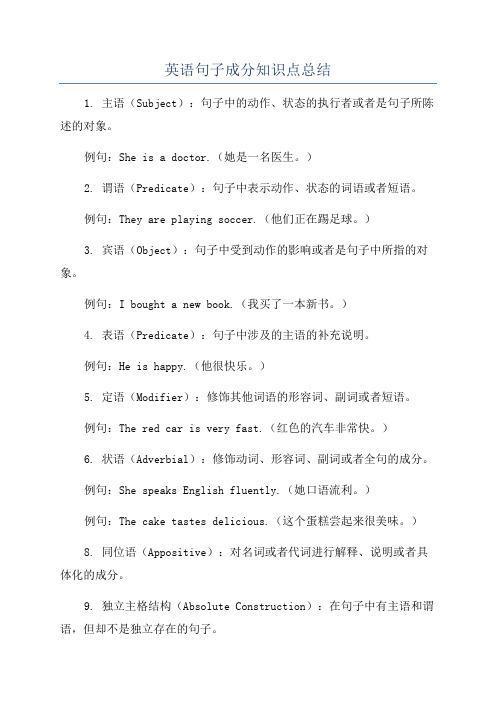
英语句子成分知识点总结
1. 主语(Subject):句子中的动作、状态的执行者或者是句子所陈述的对象。
例句:She is a doctor.(她是一名医生。
)
2. 谓语(Predicate):句子中表示动作、状态的词语或者短语。
例句:They are playing soccer.(他们正在踢足球。
)
3. 宾语(Object):句子中受到动作的影响或者是句子中所指的对象。
例句:I bought a new book.(我买了一本新书。
)
4. 表语(Predicate):句子中涉及的主语的补充说明。
例句:He is happy.(他很快乐。
)
5. 定语(Modifier):修饰其他词语的形容词、副词或者短语。
例句:The red car is very fast.(红色的汽车非常快。
)
6. 状语(Adverbial):修饰动词、形容词、副词或者全句的成分。
例句:She speaks English fluently.(她口语流利。
)
例句:The cake tastes delicious.(这个蛋糕尝起来很美味。
)
8. 同位语(Appositive):对名词或者代词进行解释、说明或者具体化的成分。
9. 独立主格结构(Absolute Construction):在句子中有主语和谓语,但却不是独立存在的句子。
这些是英语句子中常见的句子成分知识点。
了解并掌握这些知识点可以帮助你更好地理解句子结构和构建自己的句子。
英语8种句子成分
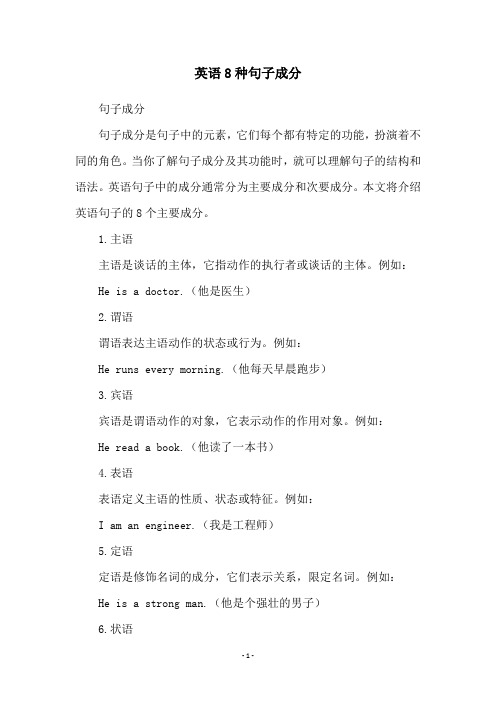
英语8种句子成分
句子成分
句子成分是句子中的元素,它们每个都有特定的功能,扮演着不同的角色。
当你了解句子成分及其功能时,就可以理解句子的结构和语法。
英语句子中的成分通常分为主要成分和次要成分。
本文将介绍英语句子的8个主要成分。
1.主语
主语是谈话的主体,它指动作的执行者或谈话的主体。
例如: He is a doctor.(他是医生)
2.谓语
谓语表达主语动作的状态或行为。
例如:
He runs every morning.(他每天早晨跑步)
3.宾语
宾语是谓语动作的对象,它表示动作的作用对象。
例如:
He read a book.(他读了一本书)
4.表语
表语定义主语的性质、状态或特征。
例如:
I am an engineer.(我是工程师)
5.定语
定语是修饰名词的成分,它们表示关系,限定名词。
例如:
He is a strong man.(他是个强壮的男子)
6.状语
状语表示动作的时间、地点、原因等方面的信息。
例如:
He goes to school every day.(他每天都去上学)
7.补语
补语提供句子的附加信息,补充完整句子的意思。
例如:
He is a doctor, so I trust him.(他是医生,所以我信任他) 8.同位语
同位语补充说明主语的性质或状态。
- 1、下载文档前请自行甄别文档内容的完整性,平台不提供额外的编辑、内容补充、找答案等附加服务。
- 2、"仅部分预览"的文档,不可在线预览部分如存在完整性等问题,可反馈申请退款(可完整预览的文档不适用该条件!)。
- 3、如文档侵犯您的权益,请联系客服反馈,我们会尽快为您处理(人工客服工作时间:9:00-18:30)。
9
定语
定语为句子的次要成分,起修饰限制名词或代词的作用,可分为前置定语和后置定语。一般由形容词性物主代词、数词、 形容词、副词、介词短语、动词不定式、分词(短语) 或句子充当。
His father is a doctor. 他父亲是一名医生。 Mr. Green has two sons. 格林先生有两个儿子。 The girl under the tree is Kate. 在树底下的那个女孩是凯特。 The man downstairs couldn’t sleep well. 楼下的那个人不能睡好觉。 I bought a new dictionary. 我买了本新字典。 Can you find out the answer to the question?你能找到这个问题的答案吗? Would you like something to drink? 你想要些喝的东西吗? A man going to die is always kind-hearted. 人之将死,其言也善。 The suggestion sent to the committee was adopted. 送往委员会的建议被采纳了。 Do you know the man who is standing next to Mr. Green? 你认识站在格林先生旁边的那个人吗?
5
表语
表语与连系动词连用,构成系表结构,说明主语的身份或特征,一般由形容词、名词、动名词词、动词不定式、分词等 充当。
They are brother and sister. 他们是兄妹。 Her father is sixty-five. 她父亲65岁。 John is captain of the team. 约翰是足球队的队长。 The poor boy was myself. 那个可怜的孩子就是我自己。 All you need do is to take a taxi from the airport. 你只需从机场打个的即可。 My favourite sport is swimming. 我最喜爱的运动是游泳。
11
状语
英语中的状语用来修饰动词、形容词或副词,主要由副词、介词短语、动词不定式、分词充当或由连词引导状语从句, 表示时间、地点、程度、目的、方式,比较、让步、条件、原因、结果、伴随等。
(1) 时间状语 I often get up at 5:30 in the morning. 我常常在早上5:30起床。 Hearing the news, they felt very excited. 听到这个消息,他们感到很兴奋。 (2) 地点状语 Pandas only live in China. 熊猫仅生活在中国。 (3) 目的状语 We’ll go to the beach for a picnic this Sunday. 这个星期天我们将去沙滩野炊。 He took some change from his pocket to buy a newspaper. 他从口袋里掏出一些零钱来买报 纸。 She got up early so that she could catch the first bus. 她早早地起床,以便能够赶上这辆早班车。
英语句子的八大成分.
主语
句子一般要有主语。在简单句中,主语一般由名词、代词、动名词或动词不定式(短语) 来充当。动名词、动词不定式作 主语时通常用 it 作形式主语。
■名词作主语 English is very important. 英语是很重要的。 The students all love their English teacher. 这些学生都爱他们的英语老师。 ■代词作主语 They go to school by bus. 他们乘公共汽车上学。 Most of the students come from the countryside. 大多数学生来自农村。 ■动名词作主语 Watching TV too much is bad for your eyes. 看电视太多对你的眼睛是有害的。 It’s no use regretting it. 后悔是无用的。 ■动词不定式(短语)作主语 To see is to believe. 眼见为实。 It is very hard to get to sleep. 入睡
15
宾语补足语
宾语补足语主要用来补充说明宾语,与宾语之间存在逻辑上的主谓关系或动宾关系,可由名词、形容词、动词不定式、 分词等充当。
Tom found the climb quite easy. 汤姆觉得爬山很容易。 Please call me Jim. 不要这样正规,叫我吉姆好了。 You must keep it clean. 你要把它保持干净。 I have the car waiting. 我让汽车等着。 We had the machine repaired. 我们请人修理了机器。 Why don’t you have your hair cut? 你为什么不理发? He had his finger cut. 他的手指弄伤了。 I had my watch stolen yesterday. 我的表昨天被人偷去了。 She has plenty of clothes to wear. 她有足够的衣服穿。 He made me repeat the story. 他要我把那事重讲一遍。 Rain makes plants grow. 雨水使植物生长。
13
(4) 方式状语 We usually go to school on foot. 我们通常步行去上学。 Please do it as I told you. 请按我告诉你的去做。 (5) 让步状语 Though she has a lot of money, she is unhappy. 虽然她很有钱,而她并不幸福。 No matter what happens, I will never lose heart. 无论发生什么,我将决不失去信心。 (6) 条件状语 If you don’t work hard, you’ll fall behind the others. 假如你不努力学习,你将落后于别 人。 Given more attention, the flowers would have grown better. 如果给予更多的关心的话,这些花将长 得更好。
14
(7) 原因状语 We didn’t go to the park because of the bad weather. 由于天气不好,我们没有去公园。 Being ill, he didn’t go to school. 由于病了,他没有去上学。 (8) 结果状语 The wind was so strong that we could hardly move forward. 风是如此地猛烈,以致于我们寸步难行。 He left early, so that he caught the train. 他早早地离去,(结果) 因此赶上了火车。 (9) 伴随状语 The doctor hurried off, with a medicine box under his arm. 这位医生匆匆离去,胳膊下夹着一个药箱 子。 The teacher came into the classroom, followed by a group of his students. 老师进到教室里来,后面跟 着一群学生。
7
宾语
宾语是行为动作的对象,一般可分为动词宾语和介词宾语,充当宾语的可以是名词、代词、动名词、动词不定式或整个 句子。
I like Chinese food. 我喜欢中国菜。 I bought a ticket for Milan. 我买了一张去米兰的车票。 I enjoyed talking to you. 我和你谈话很高兴。 Have you finished dressing? 你衣服穿好了吗? He certainly did not want to join them. 他确实不想参加他们的活 动。 They decided to close the border. 他们决定封闭边境。 We hoped that all would come well. 我们希望一切都会好转。 We expected that you would stay for a few days. 我们预计你会待几天的。
3
谓语
谓语必须由动词充当,但动词不定式、动名词、分词为非谓语动词不能作谓语。可作谓语的动词一般为行为动词(表动作) 和连系动词(表状态),行为动词根据其后是否可直接接宾语,又可分为及物动词和不及物动词。
■及物动词作谓语 We should help each other. 我们应该互相帮助。 They respect one another. 他们互相尊重(对方)。 All of the students like the novel. 所有这些学生都喜欢这本小说。 ■不及物动词作谓语 He left here yesterday. 他昨天离开这儿。 You’re driving too fast. 你开车开得太快了。 The teacher came in, book in hand. 老师走进教室,手里拿着书。 ■连系动词表状态 He is an excellent teacher. 他是位优秀的教师。 Her son is a friend of ours. 她的儿子是我们的朋友。 Ours is a great countryas painted white. The old man was found weak.
